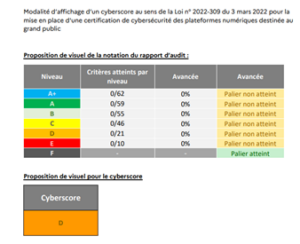In the Senate report of 16 February 2022 on the introduction of cybersecurity certification for digital platforms aimed…
In the Senate report of 16 February 2022 on the introduction of cybersecurity certification for digital platforms aimed at Senator Anne-Catherine Loisier pointed out that, despite a growing increase in cyber attacks[1] , companies were not changing their behaviour in the face of the threat[2] .
In recognition of the fact that cybersecurity is an essential counterpart to the digital economy and, more broadly, to the digitalization of all areas of society, the legislator has imposed new obligations on platform operators.
Act no. 2022-309 of 3 March 2022 for the introduction of cybersecurity certification for digital platforms aimed at the general public (known as the “Cyber-score Act“) introduced into the consumer code[3] an obligation to inform consumers about the level of security of platform operators and the data they host.
This law introduces an obligation for digital operators to inform users of their services about the level of security of their data, which was not provided for in the General Data Protection Regulation (GDPR). The latter only provides for personal data security measures to be put in place but does not inform data subjects of their robustness[4] .
The new article L.111-7-3 of the French Consumer Code states that:
“Operators of online platforms (…) whose activity exceeds one or more thresholds defined by decree shall carry out a cybersecurity audit, the results of which shall be presented to the consumer (…), covering the security and location of the data they host, directly or via a third party, and their own security (…)”.
The audit referred to in the first paragraph is carried out by audit service providers qualified by the Agence nationale de la sécurité des systèmes d’information.
(…)
The result of the audit is presented to the consumer in a legible, clear and comprehensible manner and is accompanied by a complementary presentation or expression, by means of a colour information system.”
The cyber-score law came into force on 1er October 2023.
The implementing decree and the order specifying its application are awaiting publication.
1. Who is affected by this communication obligation?
The scope of application is particularly broad as it concerns (i) online platform operators as defined in Article L111-7 of the French Consumer Code and (ii) persons providing non-number-based interpersonal communications services whose activity exceeds a certain threshold set by decree. The draft decree provides for a threshold of 25 million unique visitors per month from French territory by 2024 [5]. The legislator’s aim is not to penalise very small businesses (VSEs), SMEs or innovative start-ups in terms of online services.
In concrete terms, digital platforms (marketplaces, comparison sites, search engines, social networks, etc.), messaging services and videoconferencing software intended for the general public are affected by the obligation to carry out cyber-security audits and to communicate the results to the public, provided they exceed the threshold of 25 million unique visitors per month from French territory by 2024.
2. How does a cyber sucurity audit work?
The operators concerned will have to use an information systems security audit service provider (PASSI) qualified by the French National Agency for Information Systems Security (ANSSI).
The audit will be carried out based on information that is open, freely accessible, and non-intrusive by the service provider, and will cover the security and location of the data. In this respect, a location within the European Union is a guarantee of data security, in terms of the application of the RGPD, but also in terms of digital sovereignty.
However, data location is not the only criterion to be considered. The draft decree provides for the following control points [6] :
- Organisation and governance (cyber insurance, security certification, etc.)
- Data protection (security measures relating to data hosting, exposure of data to extraterritorial legislation, sharing of data with third parties)
- Knowledge and control of the digital service (mapping of information processed by the digital service and sensitivity, mapping of service providers, existence of network partitioning mechanisms to protect the digital service from a rebound attack on shared environments).
- Level of outsourcing (location of digital service hosting infrastructures in the EU, etc.)
- Level of exposure on the Internet (regular security scans, implementation of a solution to protect against denial of service (DDoS), user identification/authentication management, etc.).
- Security incident handling system
- Digital service audits (Carrying out regular security audits before the digital service is implemented (audit/Bug bounty/etc.))
- Raising awareness of cyber-risks and the fight against fraud (raising awareness of cyber-security risks, warning users of cyber-risks of scams and fraud and recommendations for precautions, etc.).
- Secure development (OWASP rules, etc.)
It should be noted that the control points mentioned above must already be considered by businesses as part of their GDPR compliance.
We will have to wait for the publication of the decree before we have an exhaustive list of the cyber security audit checkpoints.
3. How does a cyber sucurity audit work?
Following the example of the “nutriscore”, the legislator stipulates that economic operators must publish a “cyberscore” on their website. The draft decree states that the marking must be displayed prominently on the home screen and that the cyberscore audit score and the date on which it was carried out must appear prominently in the online service’s legal notices.

The result of any cyber-audit must be clearly displayed and accessible on the operator’s website.
The aim is to enable consumers to be better informed about the protection of their online data.
4. How do i display my cyber-score?
In the event of failure to comply with this obligation, and in accordance with Article L131-4 of the French Consumer Code, the operator is liable to an administrative fine imposed by the DGCCRF of up to €75,000 for an individual and €375,000 for a legal entity.
In addition, a low cyber-score will inevitably damage the image of the operator concerned and reduce the confidence of users of its site.
***
In this context, it is essential for the companies concerned to put in place the appropriate technical and organisational security measures now.
The IT/Data department at Joffe & Associés can help you ensure that your platforms are compliant (GDPR compliance, securing relations with third parties, cyber-security awareness, etc.).
[1] According to the report, 54% of businesses said they had suffered at least one cyber-attack in 2021, and 30% of cyber-attacks led to the theft of personal, strategic or technical data.
[2] Senate report n°503 p6 https://www.senat.fr/rap/l21-503/l21-5031.pdf
[3] Article L.111-7-3 of the Consumer Code
[4] Article 32 of the RGPD
[5] https://www.entreprises.gouv.fr/files/files/secteurs-d-activite/numerique/ressources/consultations/projet-decret-cyberscore.pdf
[6]https://www.entreprises.gouv.fr/files/files/secteurs-d-activite/numerique/ressources/consultations/projet-arrete-cyberscore.pdf




